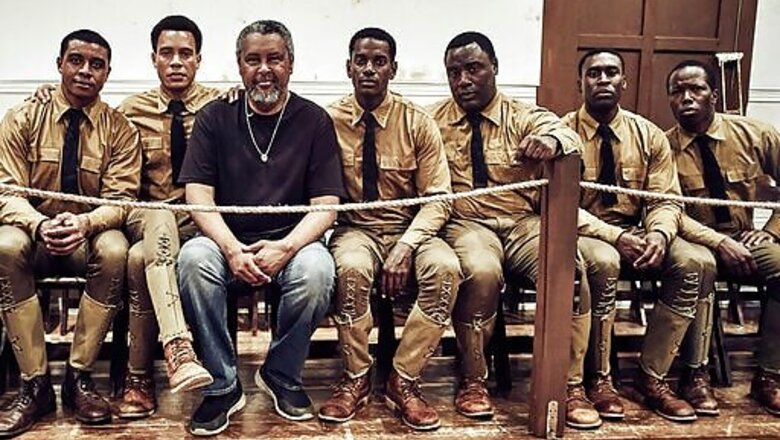
views
NEW YORK The sole photograph related to the Houston Riot of 1917 shows 64 Black soldiers sitting with arms folded and legs crossed behind a rope. Their sheer number, in a courtroom otherwise populated by white men, suggests theyre part of the audience but theyre not. Theyre the defendants in whats considered the largest murder trial in American history.
When the writer-director Kevin Willmott first came upon the photo 30 years ago, he was mystified by it. What was the story behind it? And how had he never heard of the Houston Riot before?
That led, ultimately, to The 24th, Willmotts dramatization of one of the bloodiest and most tragic chapters in the dark history of Jim Crow America.
Shortly after the U.S. entered World War I, 156 soldiers in an all-Black regiment, the 24th, were stationed near Houston. After beatings and harassment by locals and police officers — including the dragging of a Black woman from her home that led to an attack and the arrest of a Black soldier — the infantrymen mutinied and marched on Houston. Some 21 died in the violence including 11 civilians. After the trial, 19 of the soldiers were hung; 41 were sentenced to life imprisonment.
In a time of reckoning for police brutality, The 24th reverberates with injustices past and present. By stretching back more than 100 years, it vividly captures an early example of unrest unleashed by racist policing. Such incidents have typically gone unmentioned in history books. Willmott calls it a hidden history.
Black people have been complaining, shouting, screaming, crying about police abuse for a long, long, long time, Willmott said in a recent interview. The movie is really an indictment for how long this problem has existed in the country.
The 24th had originally been slated to premiere in March at SXSW before the coronavirus pandemic canceled the festival. But its one of the few films that have managed to find a path forward nevertheless. On Friday, Vertical Entertainment will release it on-demand and in digital rental, two days before the anniversary of the Houston Riot, also called the Camp Logan Mutiny.
Willmott is best known as Spike Lees recent co-writer. He helped pen Chi-Raq, BlacKkKlansman and their recent Netflix release, Da 5 Bloods. He also teaches film at the University of Kansas; the star and co-writer of The 24th, Trai Byers (Empire), was once Willmotts screenwriting student.
While Willmott was working on BlacKkKlansman — which won him and Lee an Oscar — he suggested Byers look over the script. Together, they believed the film had the power to educate.
Its history. That was our main point. This is history. History that hasnt been taught, Byers said. In order to meet these moments, we need that history, we need that point of reference. Until we know where weve been, how can we know who we are?
While the horrors of slavery have sometimes been depicted in film, the in-between decades of Jim Crow have more seldom been shown. That could be changing. The opening of HBOs Watchmen, set amid the Tulsa Race Massacre of 1921 — in which white mobs leveled 35 square blocks of the wealthy Black Oklahoma community known as Black Wall Street — exposed many to a history they knew little about.
People need to know about the period after slavery. Slavery is the real sin of American life, but it didnt end after slavery, says Willmott. That period after slavery, from the 1880s to the 1930s is for African Americans literally almost a Holocaust. That part of our history was really just erased from history books. Black people dont know it, white people dont know it. The fact that you can wipe out a whole black section of town in Tulsa — thats like a 9/11 for Black people — and no one knows about it.
With Lee, Willmott has been digging into less well-known periods of African American history, tugging at the roots of white supremacy (“BlacKkKlansman”) and the nature of patriotism for Black Americans (“Da Five Bloods”). More often than not, theyre finding their films even more relevant than they expected.
My Brother Kevin Willmott Has The Directing And Writing Skills That Show Us The Stories That Need To Be Seen And Heard, Lee said in an email.
The obvious timeliness of The 24th was one reason its makers wanted it to come out this summer, even if movie theaters are largely closed due to the coronavirus. Descendants of three of the hanged men from the Houston Riot William Nesbit, Thomas Coleman Hawkins and Jesse Ball Moore recently petitioned the White House for posthumous pardons.
Its almost like were dealing with the George Floyds, the Breonna Taylors, the Ahmaud Arberys from a fresh take. But its not a fresh take. Theres so many tales of what happens when you push a man too far, push a group of people too far,” says Byers. What were hoping is that this film sparks the curiosity of the nation to find other stories.
Getting The 24th made 30 years ago, Willmott says, was unfathomable. It wasnt easy in 2019 either. The filmmakers didnt find a home with a major studio or a streaming company but got it made with Jordan Fudge and the socially minded media fund New Slate Ventures. Since then, Willmott believes the death of George Floyd has changed everything, including the movie industry. Floyd grew up in Houston.
I have a saying, says Willmott. We dont own history, history owns us.
___
Follow AP Film Writer Jake Coyle on Twitter at: http://twitter.com/jakecoyleAP
Disclaimer: This post has been auto-published from an agency feed without any modifications to the text and has not been reviewed by an editor



















Comments
0 comment